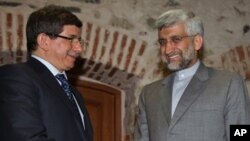The latest talks on Iran's controversial nuclear program, held in Istanbul April 14, were viewed as productive by the participants. But analysts say Turkey's role as a facilitator has weakened due to Iran's growing unhappiness with Turkish foreign policy, especially its call for regime change in Syria.
In the past, Turkey defended what it called Iran's peaceful nuclear energy program and even voted against U.N. sanctions on Iran two years ago. But Turkey's relationship with Iran has changed, as it began aligning itself with its Western allies on a series of issues.
Richard Howitt is a member of the European Parliament's committee on Turkey. "Turkey has come back into line on Iran. Turkey really lost some trust on the Iran issue and suffered in public relations terms by its opposition to sanctions, which frankly we worked very hard for at the U.N. and EU," he said.
A factor in Turkey's changing role is Syria, an important regional ally of Tehran.
The once-warm relations between Turkey's Prime Minister Recep Tayyip Erdogan and Syrian President Bashar al- Assad have deteriorated steadily over the past year due to Syria's violent crackdown on the opposition. The Turkish government's strong support for Syria's opposition has angered Iran.
This was reflected last week when Iran tried to change the venue for the P5+1 talks away from Istanbul. Mr. Erdogan shot back with a terse statement saying "because of the lack of honesty, Iran is "continually losing its international prestige."
In the end, Istanbul did host the talks, but Iran and the other parties agreed to hold another round in Baghdad next month.
Soli Ozel at Turkey's Kadir Has University says that despite the chill in relations, Tehran still sees Ankara as being useful. "Iran still needs Turkey's good offices because it is the only country that really, really tries very hard for a political solution," he said.
In addition, Turkey gets about 80 percent of its natural gas and more than half of its oil from Iran and Russia, a key Iranian ally. And that, Ozel says, should reassure Iran that Turkey isn't about to make any rash moves.
Some critics say Turkey may have lost its role as a facilitator on Iran's nuclear issue. But diplomatic correspondent Semih Idiz for the Turkish newspaper Milliyet says there still remains a potentially important future role for Ankara. "The Iran talks seem to be going sufficiently with their own steam. But when you read the small print, the sides are clinging to their positions. So if there is need for a country with clear and open channels with both sides, then possibly there is some role that Turkey can play," he said.
Iran's next meeting with the U.N. Security Council's five permanent members plus Germany will be in Baghdad in May.
The talks are expected to focus on the complex and difficult issues of persuading Tehran to agree to measures that will reassure the international community that Iran is not using its nuclear energy program to develop weapons.
Tehran has already called for an easing of international sanctions in exchange for such moves. Many analysts say reconciling the opposing demands is expected to be difficult.
News
Turkey's Role in Iran Nuclear Talks Could Diminish
- By Dorian Jones




